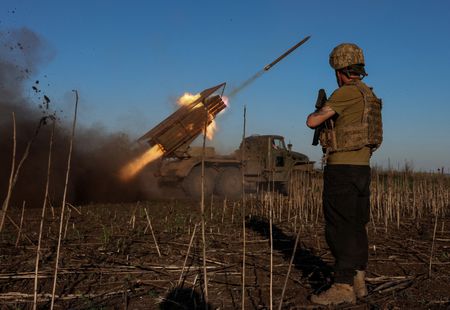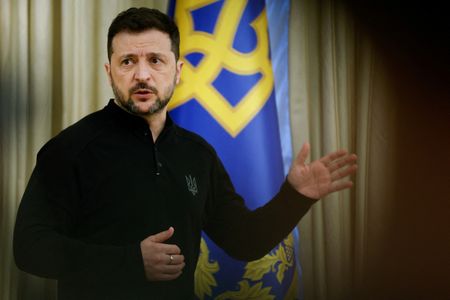By Elizabeth Piper, Daphne Psaledakis and John Irish
LONDON/PARIS (Reuters) – U.S., Ukrainian and European officials meet in London on Wednesday to discuss ending Russia’s war in Ukraine but chances of any breakthrough look slim after most foreign ministers pulled out despite U.S. pressure for a deal.
U.S. Secretary of State Marco Rubio cancelled his trip to London and a meeting due to also include foreign ministers from Britain, Ukraine, France and Germany was postponed.
A European official said Rubio had indicated concern that Ukraine could revert to its previous tough positions, making any breakthrough at the talks impossible.
The downgrading of the talks comes despite warnings by U.S. President Donald Trump that Washington could walk away if there was no progress on a deal soon, and Trump had said on Sunday he hoped Moscow and Kyiv would make a deal this week to end the three-year conflict.
Few diplomats had considered that realistic given the significant gaps remaining.
Rubio spoke to British Foreign Secretary David Lammy late on Tuesday and said he looked forward to rescheduling his trip in the coming months after Wednesday’s “technical meetings”.
A spokesperson for British Prime Minister Keir Starmer had said the ball was in Russia’s court on the talks: “We clearly support President Trump’s attempts to bring peace (and) Ukraine’s calls for Russia to commit a full ceasefire.”
Trump special envoy Steve Witkoff had not been part of the London talks. But, on Washington’s parallel track of diplomacy with Moscow, he will meet with Russian President Vladimir Putin this week in Russia, the White House said.
The London meeting is a follow-up to a similar session in Paris last week where U.S., Ukrainian and European officials discussed ways to achieve peace. Trump’s Ukraine envoy General Keith Kellogg will still be in London for the talks.
The objective last week was for the Americans, Europeans and Ukrainians to formulate a joint position by trying to move Washington closer to the European and Ukrainian position, European diplomats said.
But some of Washington’s proposals were unacceptable to European countries and Kyiv, multiple sources said, leaving the sides divided.
STICKING POINTS
Rubio last week said a U.S. framework that he and Witkoff proposed in Paris received an encouraging reception. But the sources said that among the U.S. proposals was recognizing Russia’s illegal annexation of Crimea, a move that is a non-starter for Europe and Ukraine.
Beyond Crimea, other major sticking points remain, including Russia’s push for lifting of European Union sanctions against it before negotiations are finished, which Europe staunchly opposes, diplomats said.
European powers last week detailed to the United States what they view as the non-negotiable aspects of a potential Ukraine-Russia peace accord, France’s Foreign Minister Jean-Noel Barrot said on Tuesday, playing down chances for a deal this week.
The U.S. proposed last week to establish a neutral zone at the Zaporizhzhia nuclear power plant in Russian-occupied Ukraine, according to European diplomats. Ukrainian President Volodymyr Zelenskiy said on Tuesday he would be ready to partner with the United States to restore the plant, which is not operating.
Some of Washington’s ideas are also likely to displease Moscow. Two diplomats said the U.S. was not pushing a Russian demand to demilitarize Ukraine and was not opposed to a European force as part of future security guarantees for Ukraine.
Since taking office in January, Trump has upended U.S. foreign policy, pressing Ukraine to agree to a ceasefire while easing many of the measures the Biden administration had taken to punish Russia for its 2022 full-scale invasion of its neighbour.
The U.S. president has repeatedly said that he wants to broker a ceasefire in Ukraine by May, arguing the U.S. must end a conflict that has killed tens of thousands and risks a direct confrontation between the U.S. and nuclear-armed Russia.
Europe has been increasingly concerned over the Trump administration’s overtures towards Moscow, after the failure so far of Trump’s efforts to secure a ceasefire in the war.
(Reporting by John Irish in Paris, Elizabeth Piper and Daphne Psaledakis in London; Additional reporting by Erin Banco and Steve Holland in Washington; Additional writing by Kate Holton; Editing by Humeyra Pamuk, Cynthia Osterman and Alison Williams)











